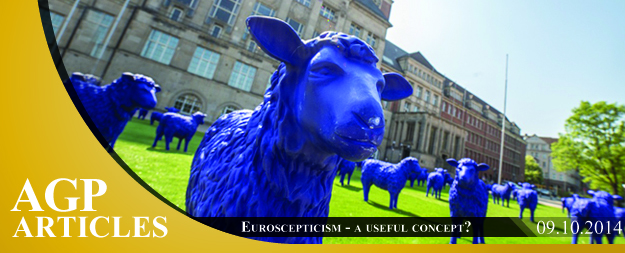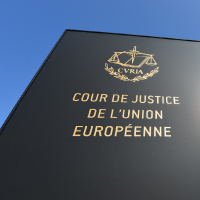
Euroscepticism – a useful concept?
The European Union expanded to twenty-eight members in recent years due to enlargement into Central and Eastern Europe. The European Union has grown and is continuing to grow. This growth is creating changes in the way the European Union is studied, and is increasing the studies. It is therefore important to look at the European Union widely in order to clearly see the effects of European integration on domestic politics.
When looking at how the EU affects domestic politics of different member states, it is clear that different member states view Europe very differently. The varying visions and versions of Europe creates scepticism about Europe, and in some member states, during the accession stages, there was scepticism even about the idea of membership from some parties within the state. At the time, this was seen as both positive and negative. On the one hand this was seen as a danger for those that sought enlargement but on the other hand, it was a good indication that the candidate countries had the politics of the European Union and the process of European integration implanted in their political systems just as it is in existing member states.
“The emergence of Euroscepticism across the range of members…of the EU is evidence of a truly European politics of European integration emerging” (Taggart and Szcezerbiak).
Euroscepticism is a concept that is important to focus on because it contributes to our understanding of European integration and of how European integration affects domestic politics and vice versa.
There are two types of Euroscepticism according to authors Taggart and Szcezerbiak, these are hard and soft Euroscepticism.
Hard Euroscepticism is where “there is a principled opposition to the EU and European integration”. This can be seen in countries that think they should withdraw from membership, or “whose policies towards the EU are tantamount to being opposed to the whole project of European integration as it is currently conceived…” (Taggart and Szcezerbiak). For hard Eurosceptics, the EU may be opposed because it embodies some “previously identified ’enemy’ (e.g. capitalism for communists, socialism for the right, bureaucracy for populists, supranationalism for nationalists or, neo-liberalism for socialists)” .
Soft Euroscepticism is where “there is NOT a principled objection to European integration or EU membership but where concerns on one (or a number) of policy areas lead to the expression of qualified opposition to the EU, or where there is a sense that ‘national interest’ is currently at odds with the EU’s trajectory” (Taggart and Szcezerbiak). So in short soft Euroscepticism is where there is real scepticism about the way European integration is developing. For soft Eurosceptics, the EU is problematic when its development runs counter to interests, policies or issues that they support.
The bifurcation of Europe into West and East is very important with regards to Euroscepticism. One needs to address ‘Western models of politics’ when applying to EU countries in the East. Opposition to the EU brings together a mix of countries with different ideologies. Opposition extends from new politics, old far left politics, immature politics (as Cyprus was made Republic in 1960) ranges to the far right and neo fascism.
Paul Lewis (Open University) argued that it is important to consider the EU as embedded in a wider set of Euro-Atlantic structures for his presentation on ‘The impact of the European Issue on East European Parties’. He had stated that democratization had largely been played out and most had stable party systems. He noted that there was a trend for attitudes towards European integration along of modern-traditionalism and state intervention-economic liberalism and that the major parties of government geared towards liberalism, whilst the Eurosceptical parties were gearing towards the authoritarian style of leadership. This is a very good example of residual old government type of leadership in eastern European countries and hard Euroscepticism.
There are countless debates that cause Euroscepticism but the main causes for Euroscepticism was due to the expansion of European integration through the Euro, enlargement, the EU’s foreign policy role and military capabilities and, the question of whether the constitutional treaty of the European Union will be ratified creating a ‘Constitution of Europe’.
The European Union Constitutional Treaty was signed October 29th 2004. This launched the ratification process. The question as to whether the Constitutional Treaty would be ratified was the cause for many debates. Some thought that a ‘European Constitution’ should be adopted as a basis for the establishment of a future European Federal State and in order for greater legitimacy with less democratic deficit within the European Union. Other Eurosceptics did not think that the European Union (EU) should become a ‘United States of Europe’. Though the ratification process in Hungary and Lithuania was relatively simple, only 18 states ratified it, the remaining states showed their strong opposition. The Constitutional Treaty was never ratified.
The cause for Euroscepticism in relation to enlargement was that there was a lack of transparency about the process of accession itself as negotiations were done behind closed doors and media coverage was vague, and confusion as to the allocation of structural funds and agricultural subsidies.
Euroscepticism has become an established part of all EU Member States’ party systems. It does however vary considerably in how and where it manifests itself in these different party systems. Hard Euroscepticism is far less common in Member States than soft Euroscepticism. Euroscepticism is not a new thing. In Britain, Sweden and Denmark, policy Euroscepticism is expressed primarily through opposition to the Euro while in other countries that are already part of the single currency zone, it is focused on other issues such as giving further powers to supranational EU institutions.
Opposition to the EU also seems to be related to party politics. When discussing Euroscepticism it is important to consider the roles of different political parties as it gives a clearer view, through party competition in Europe, about the European integration process and how it is being brought into domestic politics. This is one of the main reasons why Euroscepticism is a useful concept, because those interested in European integration need to understand party competition in Member states and those interested in political parties need to understand the nature of the European issue. By marrying these concerns a picture can be painted to see how party systems in Europe are working with regards to the integration process (Taggart and Szcezerbiak).
One can mistakenly regard Euroscepticism as the loss of national identity and culture. However, the Charter of Fundamental rights of the European Union states that:
“Conscious of its spiritual and moral heritage, the Union is founded on the indivisible universal values of human dignity, freedom, equality and solidarity; it is based on the principles of democracy and the rule of law. It places the individual at the heart of its activities, by establishing the citizenship of the Union and by creating an area of freedom, security and justice. The Union contributes to the preservation and to the development of these common values while respecting the diversity of the cultures and traditions of the peoples of Europe as well as the national identities of the Member States…”
Euroscepticism is the principle against the increasing powers of the European Union, and the main country that is a Eurosceptic outside of the European Union is the United States of America. The USA are not at ease with Europe’s new members as it makes the European Union a much harder entity to have control over in both economic and political terms.
With Europe being in crisis, and growing evidence about its poor growth performance and high unemployment, the uneven implementation of reform at the European level has increasingly been regarded as a problem. In addition, the recent divergence between faster and slower reforming European countries has further contributed to alleviate policy makers’ doubts about reform benefits in terms of growth and unemployment.
To conclude, Euroscepticism is a useful concept as it not only tells us about the various sceptics and their reasoning behind their scepticism which is important in order for other Member States and the public to get a better understanding of the European integration process, but it also shows the nature of support for European integration and other European issues.
Euroscepticism from Member States and other countries is also a useful concept as it shows that Europe is taken seriously and that it matters. If Europe was not such a powerful entity and its actions through integration not significant, then there would not be any Euroscepticism. Euroscepticism also helps us to understand national ideologies and beliefs through their own domestic respective party systems, and how for each country would adapt to the ‘European model’ systems politics. It also related to a wider process of Europeanisation including the effects of non EU institutions on domestic politics and the aspects of the EU on non-member-states in Europe. Euroscepticism is also a useful concept as it provides a different and opposite view point which is always important when trying to understand changes in politics and law caused by European integration.













